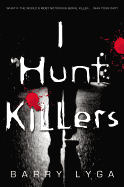
Imagine Dexter Morgan of Showtime's Dexter if he were melded with Matt Saracen of Friday Night Lights, and you'll have an inkling of what you're in for with Barry Lyga's latest novel, I Hunt Killers. It's not safe to read this book right before bed, unless you enjoy murderer-themed nightmares.
Jasper was raised by his father, serial killer Billy Dent, to be the ultimate killer--until Billy was captured, and Jazz was suddenly free from his abusive control. Jazz wants nothing more than to move on with his life, just to be a normal kid, no matter how hard it is for him (and it is, in fact, quite difficult). So when a string of murders with his father's M.O. terrorizes his home town, and all eyes are on him, he can't rest until he finds out who is responsible. But the truth is more complicated than he could have imagined, and Jazz must face several of his personal demons along the way.
This is, without a doubt, a dark and gory book. But with Jazz's no-nonsense girlfriend, Connie, and smart-aleck best friend, Howie, providing counterpoint to Jazz's brooding, it's also clever and entertaining. Lyga is no stranger to the dark side of teen life and doesn't sugarcoat, but he also doesn't wallow. Jazz's struggle to find his own humanity and to see it in those around him is painful to watch, but it's impossible not to root for him. --Jenn Northington, events manager at WORD bookstore

